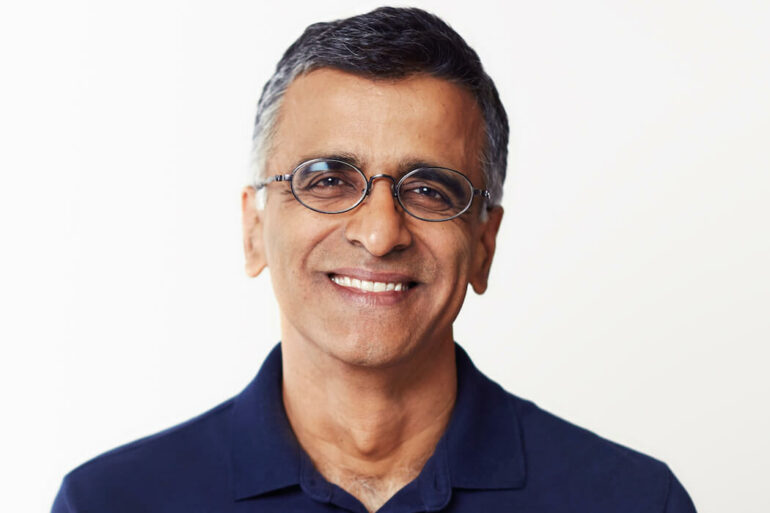Neeva, an advertising-free search engine that claims to preserve user privacy, is launching in Canada.
Sridhar Ramaswamy, the ex-SVP of ads at Google, and Vivek Raghunathan, the ex-VP of monetization at YouTube are behind the startup, which has already attracted some $80 million USD of investment since its launch in 2019.
“It is one of the ironies of modern times that when most tech products get better, cheaper, and faster, search … is actively getting worse,” Ramaswamy told BetaKit. “There are more ads. It’s a more unpleasant experience. There’s less information. It’s less believable.”
“Neeva is ready to challenge the corporate bias of Big Tech, giving consumers a long overdue improved searching and browsing experience.”
While Neeva doesn’t claim to reinvent search, the startup said its offering, which it promotes as a ubiquitous product without the annoyance of advertising and the perceived invasion of privacy, could conceivably resonate with consumers.
Ramaswamy said he and Raghunathan began Neeva because they love search, but felt like the ad supported model that served Google so well made search engines more of a product for advertisers than users.
“In other words, they want from being the so-called white pages to the yellow pages,” Ramaswamy said. “We love helping people find information. So we wanted a search engine that was all about users. It’s a very different perspective, a very different business model.”
The use of advertising and misuse of people’s privacy by multinational search engine and social media companies have led to massive fines in recent weeks. Google was ordered to pay almost $392 million USD in mid-November after settling with 40 US states over allegations that the company tracked people through their devices when when location tracking had been turned off, NPR reported.
According to the broadcaster, authorities said that since at least 2014 Google misled consumers about secretly recording their movements and then offering the data to digital marketeers to help sell advertising.
Neeva’s Canadian launch follows its European debut in October, which attracted over 30,000 signups and, ironically, was the third most searched term on Google.
Despite the recent Google case in the US, Ramaswamy opined that Europeans are even more likely to be conscious of privacy than Americans. “I think they’re a lot more conscious of how big and powerful and nation state-like companies like Google and Facebook and Apple and Amazon are,” he said.
Ramaswamy said Neeva will give Canadians an alternative option at a time when the federal government has put forward recent legislation prioritizing user privacy of Canadians. He was referring to the introduction of Bill C-27 in June. The bill is aimed at strengthening Canada’s private sector privacy law, creating new rules for the responsible development and use of artificial intelligence (AI), and continuing to put in place Canada’s Digital Charter.
“Neeva is ready to challenge the corporate bias of Big Tech, giving consumers a long overdue improved searching and browsing experience,” said Ramaswamy. “The modern-day internet has become heavily ad-dependent for no reason other than Big Tech’s self-serving exploitation of consumers’ data and privacy.”
Ramaswamy argued Neeva’s search engine is more personalized and helpful because the startup layers its own algorithms overtop a search stack that it built. He said a number of competitors call themselves privacy search engines, but in fact licence technology from larger providers. Duck Duck Go, for example, uses technology from Bing, which shows searches from Bing along with advertising, and the moment a user clicks on one of the ads, the ad eco-system begins tracking the user.
RELATED: Government of Canada launches advisory group focused on harmful online content
Ramaswamy noted search is an expensive problem to solve and that Neeva worked on its tech stack for the better part of three years. Neeva’s technology runs a multi-petabyte (one petabyte is the equivalent of one million gigabytes) scale search system. “It’s a hard problem to build,” Ramaswamy noted. “It takes money and investment.”
Seemingly, Neeva hasn’t lacked the latter, securing large funding rounds from the likes of Sequoia Capital, Greylock Ventures, Inovia Capital, and Neythri Futures Fund. Ramaswamy attributes the startup’s success in raising capital to the fact that the technology is pretty much indispensable these days.
“There are not many daily use functions out there that people turn to repeatedly,” Ramaswamy said. “This is a trillion dollar market because every user is potentially a customer. I think it’s things like that that attract investors to the problem.”
He added that Neeva’s founders and staff have deep experience in search, in infrastructure, and in machine learning. The startup is headquartered in Mountain View, California, – also home to Google – and currently has about 60 employees. Ramaswamy acknowledged that the size of the team is small compared to Google, which has thousands of employees working on the same technology. “It’s sort of remarkable that we actually have a product,” he said. “It’s a little like starting a car company with 50 people.”
Neeva is a subscription search engine with a free model available to consumers. The premium $50 annual subscription offers functions such as integrations that, for instance, allow users to connect their Slack to Neeva and search within that as well. The startup has also partnered with other privacy-minded companies in order to offer things such as password managers and VPNs.
“Increasingly, I tell people an ad blocker, a private search engine, a password manager and a VPN are like the essentials of modern life,” Ramaswamy said.
Since launching its search engine in the US in 2021, Neeva has more than one million monthly users, the startup claims. With its Canadian launch, it hopes to see millions people try the product, and gain tens of thousands of subscribers in its first year. “These are modest goals,” Ramaswamy noted, “but I think these are good one-year goals for us to strive for.”


